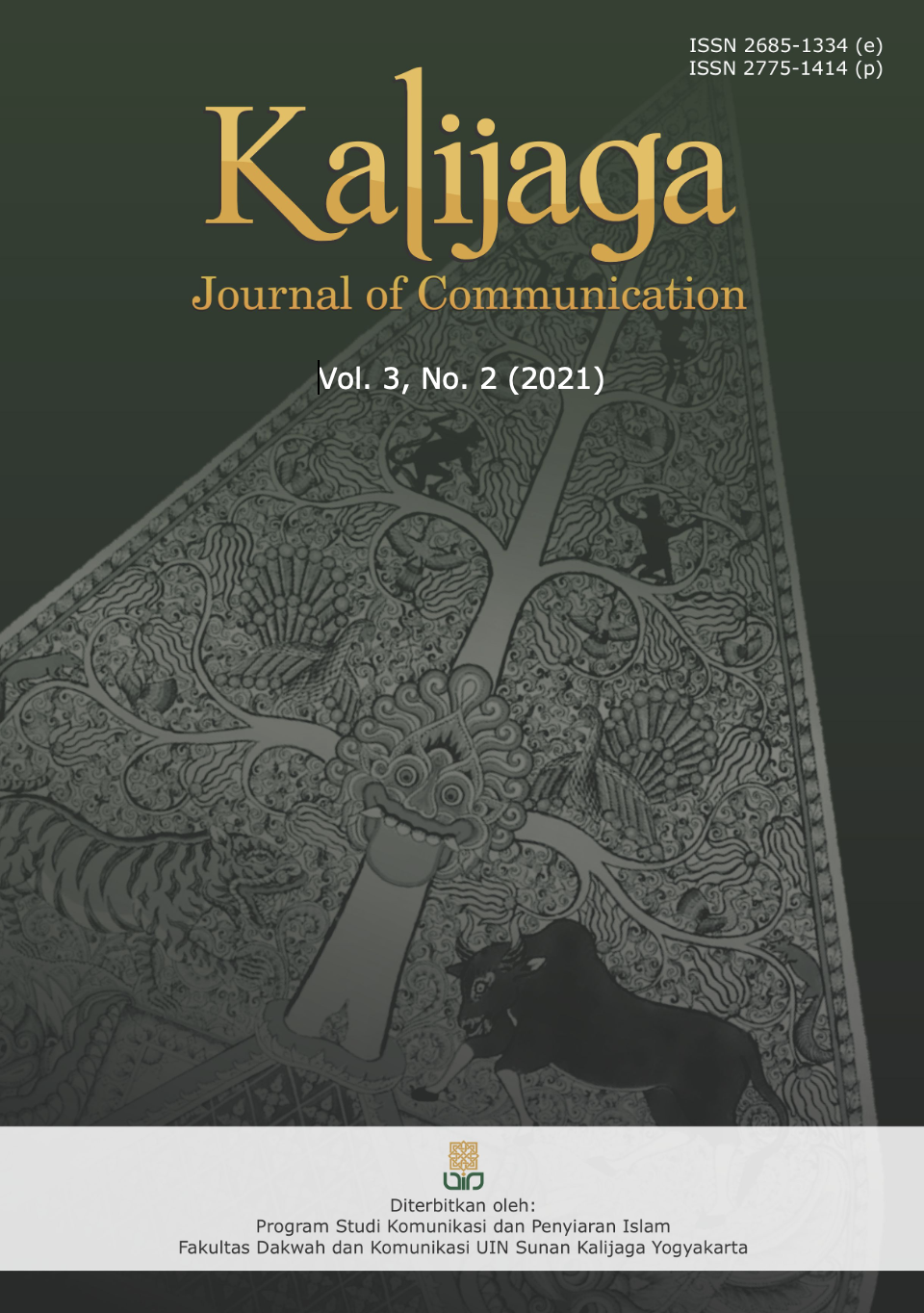Efektivitas Komunikasi dalam Kebijakan Perkuliahan Jarak Jauh: Analisis isi Kualitatif Perkuliahan Daring di Fakultas Syariah dan Hukum UIN Sunan Kalijaga
DOI:
https://doi.org/10.14421/kjc.32.06.2021Keywords:
Efektivitas Komunikasi, Kebijakan, Perkuliahan Jarak JauhAbstract
Di tengah maraknya permasalahan Covid-19 yang terus melonjak, menyebabkan Universitas Islam Negeri Sunan Kalijaga Yogyakarta menerapkan kebijakan perkuliahan jarak jauh secara virtual yang biasa disebut perkuliahan daring. Mengacu pada permasalahan tersebut, penelitian ini bertujuan untuk mencari dan memahami tingkat efektivitas komunikasi mahasiswa Fakultas Syari'ah dan Hukum dalam perkuliahan daring. Metode yang diterapkan dalam pengambilan data adalah angket yang telah dibuat melalui google form dengan menggunakan metode purposive sampling. Asumsi dari sampling yang telah didapatkan meliputi 44,9% responden kurang tahu dan hanya mengikuti kebijakan perkuliahan daring dari kampus. Sebanyak 92,2% responden sering menggunakan kelas online yang disediakan dosen untuk pembelajaran daring. dan Sebanyak 47,2% merasa kesulitan memahami pelajaran selama perkuliahan daring.References
Buku:
Anderson, Terry. “Book Review - Delivering Digitally: Managing the Transition to the Knowledge Media. Editors: A. Inglis, P. Ling, and V. Joosten.” The International Review of Research in Open and Distributed Learning 3, no. 2 (2002). https://doi.org/10.19173/irrodl.v3i2.95.
Astuti, Prida Ariani Ambar. Remaja Digital: Learn, Play, Socialize, Participate. Surakarta: Program Studi Ilmu Komunikasi Universitas Muhammadiyah Surakarta, 2011.
Crispin Thurlow, Laura Lengel, Alice Tomic. Computer Mediated Communication. London: SAGE Publications Ltd., 2004.
Griffith, David A. “The Role of Communication Competencies in International Business Relationship Development.” Journal of World Business 37, no. 4 (2002): 256–65. https://doi.org/10.1016/S1090-9516(02)00092-5.
Mulyana, Deddy. Ilmu Komunikasi : Suatu Pengantar. Cet. 22. Bandung: Remaja Rosdakarya, 2019.
Rahkmat, Jalaluddin. Psikologi Komunikasi : Edisi Revisi. Bandung: Simbiosa Rekatama Media, 2019.
Silalahi, Ulber. Metode Penelitian Sosial. Bandung: PT Rafika Aditama, 2012.
Sugiyono. Metode Penelitian Kuantitatif, Kualitatif Dan R&D. Bandung: CV. Alfabeta, 2009.
Jurnal:
Assyfa Putri, Ayu Nenden, and Irwansyah Irwansyah. “Efektivitas Komunikasi Dalam Pembelajaraan Online.” Jurnal Teknologi Dan Sistem Informasi Bisnis 3, no. 1 (2021): 54–63. https://doi.org/10.47233/jteksis.v3i1.184.
Daheri, Mirzon, Juliana Juliana, Deriwanto Deriwanto, and Ahmad Dibul Amda. “Efektifitas WhatsApp Sebagai Media Belajar Daring.” Jurnal Basicedu 4, no. 4 (2020): 775–83. https://doi.org/10.31004/basicedu.v4i4.445.
Malik, Abdul. “Hambatan Komunikasi Dalam Perkuliahan Daring Pada Masa Pandemi Covid-19.” LONTAR: Jurnal Ilmu Komunikasi 9, no. 2 (2021): 78–84. https://doi.org/10.30656/lontar.v9i2.4037.
Pratama, Ananta, Novia Cahyaningrum, Ayu Wulandari, and Siska Zunita Anggraini. “Pengaruh Perkuliahan Daring Terhadap Efektivitas Pembelajaran Mahasiswa Program Studi Administrasi Publik Universitas Pembangunan Nasional ‘Veteran’ Jawa Timur Di Era Pandemi COVID 19.” Jurnal Indonesia Sosial Teknologi 2, no. 5 (2021): 717–30. https://doi.org/10.36418/jist.v2i5.146.
Priatmoko, Sigit, Wiku Aji Sugiri, Bashori, and M. Irfan Islamy. “Distance Learning for New Students in the Era of Pandemic Coronavirus Disease (Covid-19): Implementation and Barriers.” Proceedings of the International Conference on Engineering, Technology and Social Science (ICONETOS 2020) 529, no. Iconetos 2020 (2021): 607–13. https://doi.org/10.2991/assehr.k.210421.088.
Rasyida, Hikma. “Efektivitas Kuliah Daring Di Tengah Pandemik.” Jurnal Edukasi 1, no. November (2020): 1–8.
Turahmat, Turahmat. “Implementation of Islamic Character Values in Online Learning of Literature,” 2020. https://doi.org/10.4108/eai.27-8-2020.2303198.
Downloads
Published
Issue
Section
License
Copyright (c) 2022 Ihya Ulumuddin

This work is licensed under a Creative Commons Attribution-ShareAlike 4.0 International License.
Authors who publish with this journal agree to the following terms:
- Authors retain copyright and grant the journal right of first publication with the work simultaneously licensed under a Creative Commons Attribution-NonCommercial-ShareAlike 4.0 International License. that allows others to share and adapt the work with an acknowledgement of the work's authorship and initial publication in this journal.
- Authors are able to enter into separate, additional contractual arrangements for the non-exclusive distribution of the journal's published version of the work (e.g., post it to an institutional repository or publish it in a book), with an acknowledgement of its initial publication in this journal.
- Authors are permitted and encouraged to post their work online (e.g., in institutional repositories or on their website) prior to and during the submission process, as it can lead to productive exchanges, as well as earlier and greater citation of published work (See The Effect of Open Access).


















